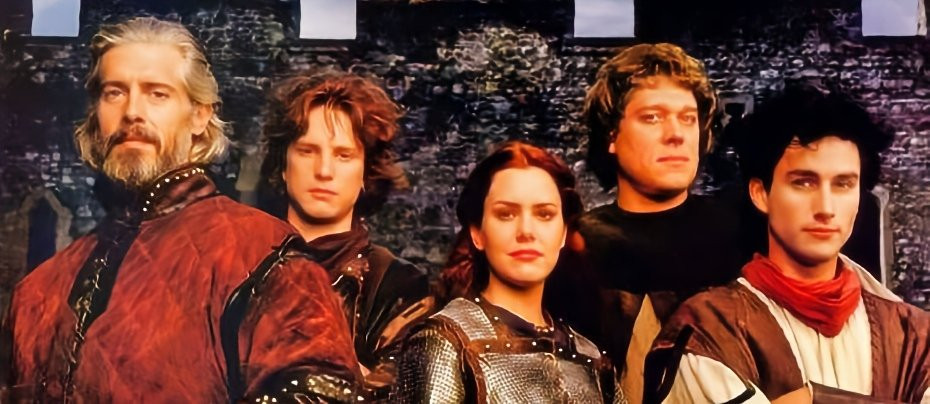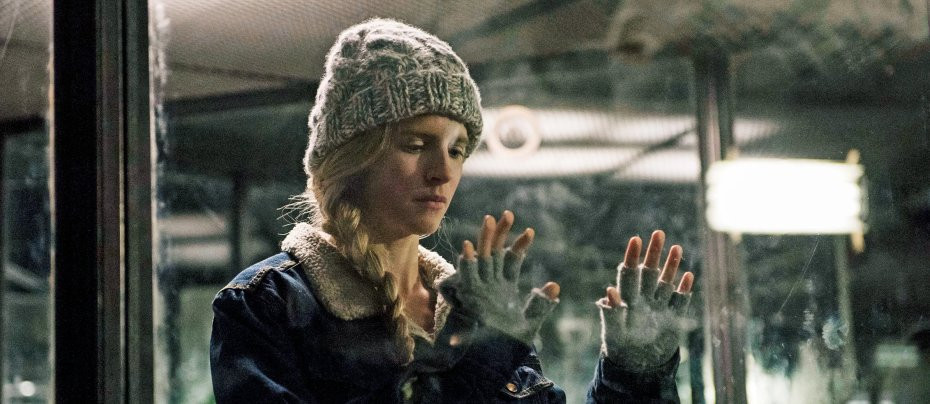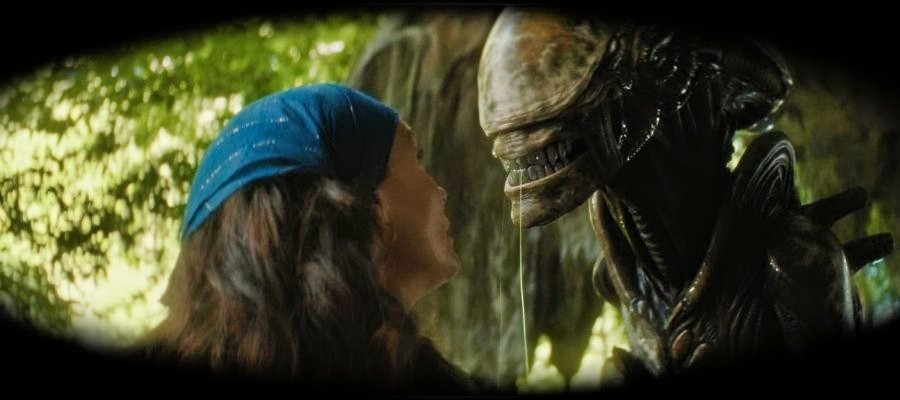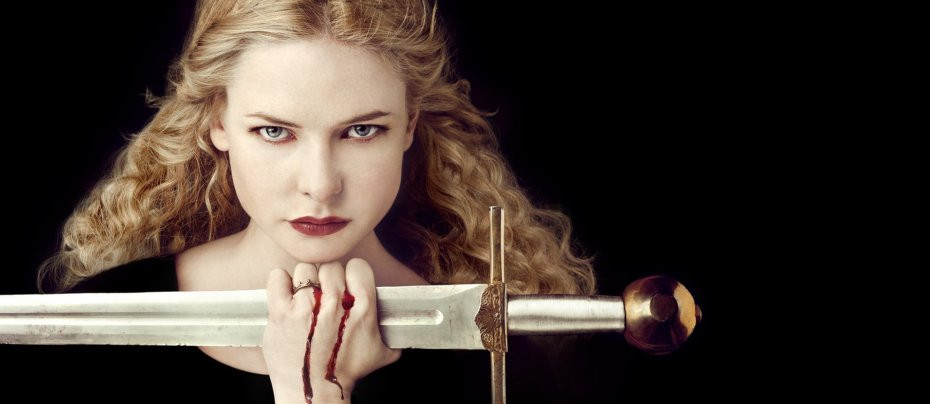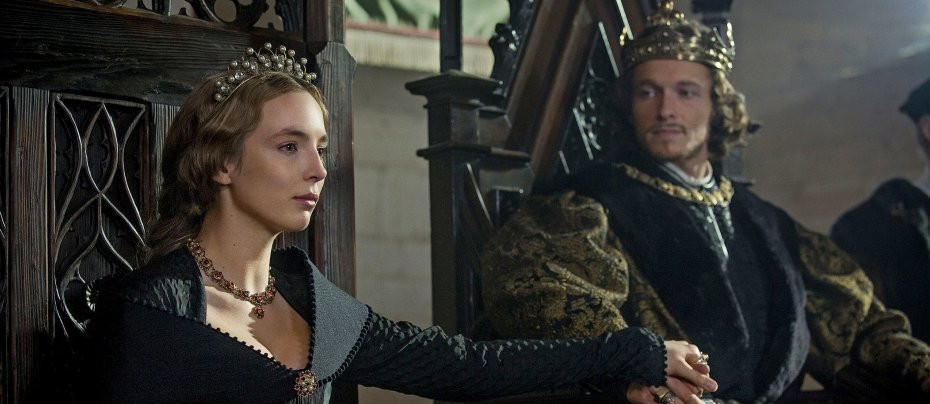
The White Princess
2017 - United Kingdom“(Jodie) Comer was at that point just crossing the threshold of stardom…”
The White Princess
Reviewed by John Winterson Richards
It remains open for discussion whether The White Queen, an adaptation of three Philippa Gregory novels on the Wars of the Roses, was a success. The BBC evidently thought not, announcing soon after its run that they were not interested in a sequel and claiming that they had only ever intended the project as a single "miniseries." The extent to which this is strictly true only those who made the final decision can say. What can be said with certainty is that there was obviously material for sequels in Gregory's other works and those involved in the production were at least aware of the possibility of a continuation.
It seems highly probable that, "miniseries" or not, the BBC would have joined in such a continuation had they considered The White Queen a definite hit. As it was, while far from a disaster, its style and tone seemed out of place with the more stately tradition of classic BBC historical drama of past decades.
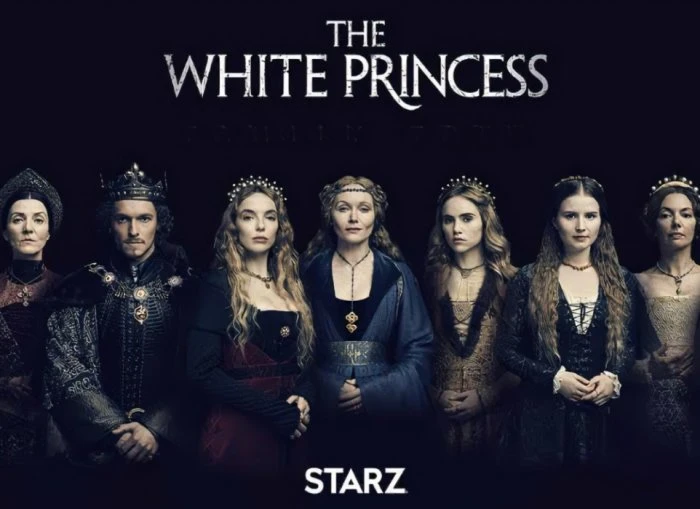
Unhampered by that tradition, Starz, the BBC's unlikely partner in commissioning The White Queen, were quite pleased with it and decided to carry on without the Beeb. So The White Princess, based on a separate Gregory novel and part of another, is both a sequel and not a sequel, a sort of semi sequel, with the same head writer, Emma Frost. The absence of BBC money seems to have had an impact on the budget, resulting in an apparently cheaper cast and locations - which, as it turned out, actually worked greatly to the new project's advantage.
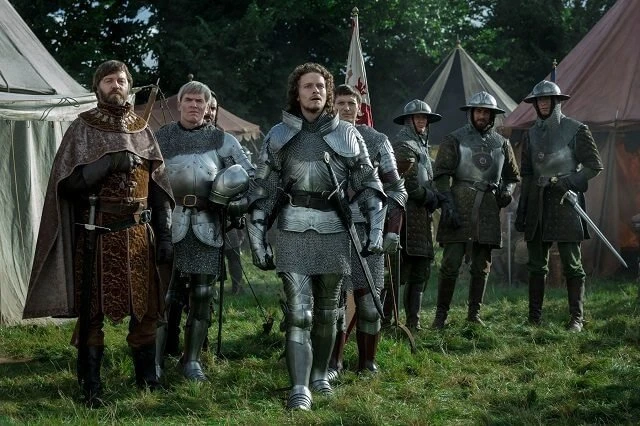
The story begins, or resumes, at the point The White Queen ended, in the immediate aftermath of the Lancastrian victory at the Battle of Bosworth. The defeated Yorkist Royal family are at the mercy of the victorious Tudors and the Tudors are making it very clear that they know it. The Yorkists do, however, have one card left to play: as a result of deal-making before the Battle between Elizabeth Woodville, the Yorkist Queen Dowager, and Margaret Beaufort, mother of the new King, Henry VII, he has sworn to marry Elizabeth's daughter, also called Elizabeth, to unite York and Lancaster.
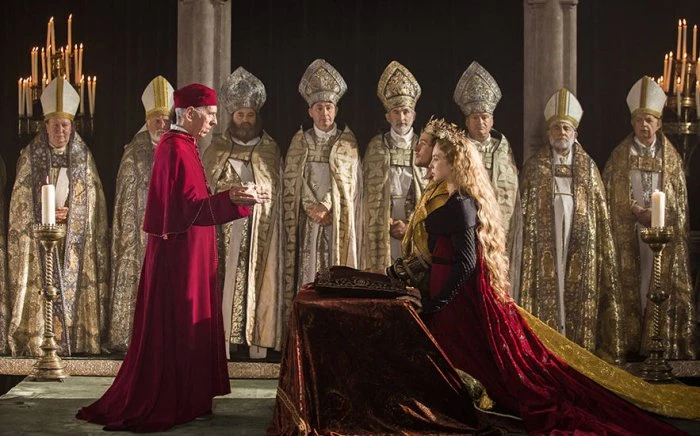
This is no dream match for the younger Elizabeth - known to history as Elizabeth of York, and here simply as "Lizzie," to avoid confusion with her mother (Elizabeths, Richards, and Edwards tend to Yorkist, and Margarets and Henries Lancastrian - Thomases and Williams might swing either way). Needless to say, the Yorkists are not exactly made welcome at the Tudor Court. As it happens, the Tudors are quite right to be wary of them because, in the "miniseries" if not in history, the Queen Dowager is intriguing for a Yorkist return. History confirms the rumours that one of her sons, the two young Princes infamously murdered in the Tower of London, somehow survived began to circulate soon after their disappearance, and The White Princess is based on the assumption that they were true. It should perhaps be stressed that this is extremely unlikely, and that the way it is handled in the script makes it seem even more improbable.
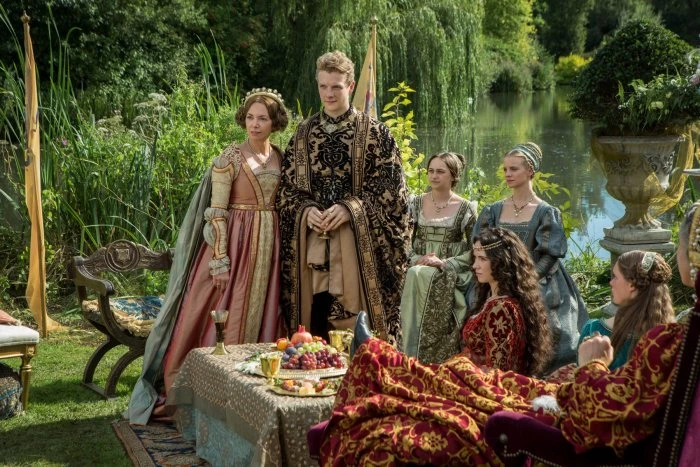
What is true is that no one knew at the time what we now know, that the Battle of Bosworth marked the effective end of the Wars of the Roses - indeed, they did not even think of them as the Wars of the Roses, a label that was applied Centuries later. Nor did anyone know then that the Tudors were destined to rule with an iron grip for over a Century. The new Dynasty of Welsh interlopers with a rather distant claim to the Throne looked very insecure. There were two serious rebellions and one more pitched battle still to come, even if, in retrospect, the Tudors were really in a much stronger position than they might have seemed or felt.
It is greatly to its credit that The White Princess evokes this sense of uncertainty very effectively. However, like The White Queen, its treatment of the details of history is eccentric to put it mildly. It is at least morally superior to most similar recent historical drama in that each episode ends with a disclaimer to the effect that some events and characters have been changed for dramatic purposes. That statement is honest, accurate, and necessary. Other historical drama please note.
The whole cast is changed completely from The White Queen - with the single exception of Caroline Goodall, who returns as Cecily, Dowager Duchess of York. Yet even she is different - the character evolving, even as the actress stays the same. Where Cecily was the Mother-in-Law From Hell in The White Queen, in The White Princess we are given a kinder, gentler Cecily, who reflects on the price her family has paid for all the conflict.
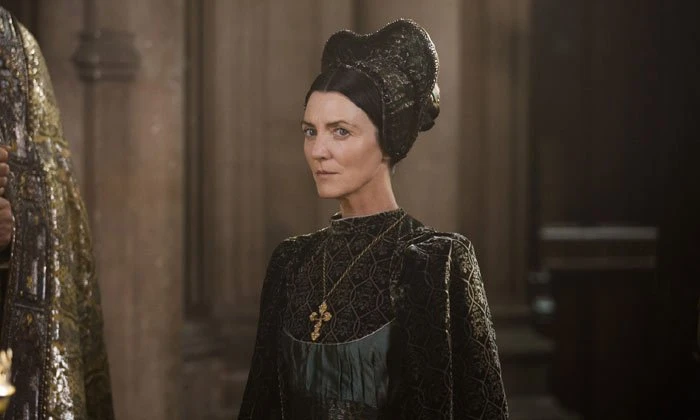
Indeed, most of the other principal characters seem completely different due to changes in the way they are written more than to their recasting. In a possible nod to the show that influenced the production of The White Queen, Michelle Fairley, the matriarch from Game of Thrones, takes over the role of Margaret Beaufort from Amanda Hale and with it the position of Mother-in-Law From Hell. Fairley gives us an authoritative Margaret, bossy, even bullying now that she finally has the power so long denied her, which is what the script requires. However, one misses the barely concealed vulnerability and poorly suppressed awareness of her own fallibility that distinguished Hale's portrayal in The White Queen.
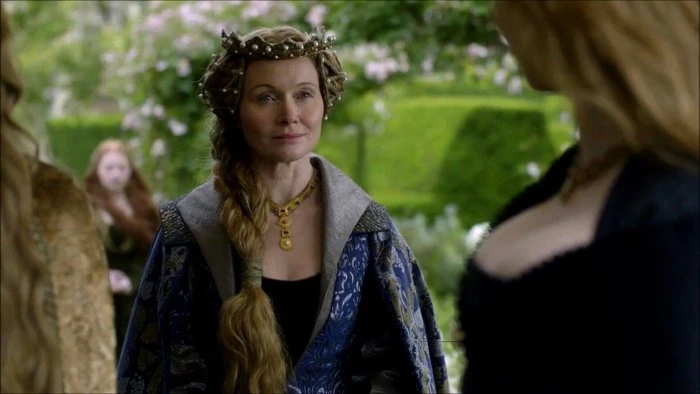
The other survivor of the three main protagonists of The White Queen has also lost something of her former depth: Elizabeth Woodville, the Queen Dowager, now played by the beautiful Australian Essie Davis, has become an embittered plotter, making the same sort of mistakes Margaret did in that position. While it would be interesting to explore in depth how these two intelligent women might have developed after they effectively swapped roles, the suggestion here is that the main effect was to make both considerably less intelligent.
This was probably done deliberately to set up our new protagonist, Lizzie, the Yorkist Princess turned Lancastrian Queen, as the character we should admire. She is in an unenviable position. At first she is the willing tool of her mother's conspiracies, eager for revenge, but then, as she gets to know Henry and, more importantly, has children by him, her loyalties become more uncertain. She realises what her mother seems to ignore, that any Yorkist claimant is an alternative, and therefore a threat, to her own sons. The maternal urge to protect offspring is a major theme in The White Princess as it was in The White Queen.
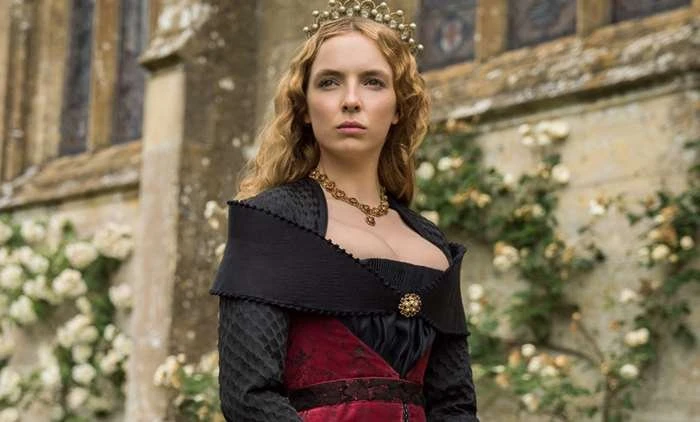
That we are kept guessing which way Lizzie will jump is due to the casting of the then up and coming Jodie Comer in the title role. Comer was at that point just crossing the threshold of stardom and watching her in the wake of her memorable performance as the unpredictable assassin Villanelle in Killing Eve, one keeps expecting her to do something totally unexpected and change direction completely whenever she appears to have chosen a particular path. It is a performance that signalled clearly that great things lay ahead of the talented young actress.
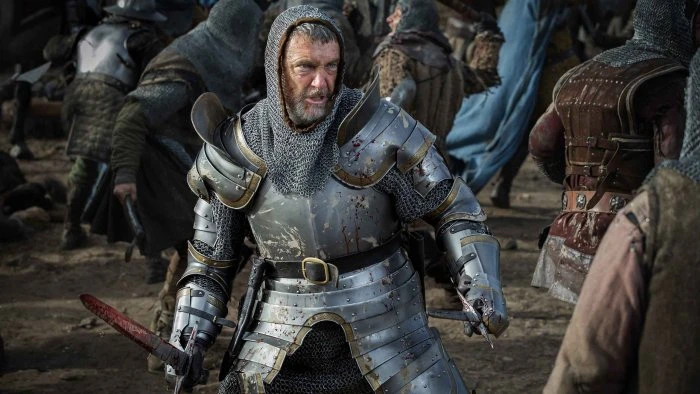
Vincent Regan is a good addition as the King's uncle, Jasper Tudor. This is no disrespect to Tom McKay who played him with a reasonable Welsh accent in The White Queen, but here the script allows the character to develop more and Regan is the right man to play the jaded old soldier who, having won the victory to which he dedicated his life, begins to wonder if it was worth it. The historical Jasper probably had few such doubts: he actually died peacefully, a Duke and very wealthy, at Thornbury Castle, one of his many homes.
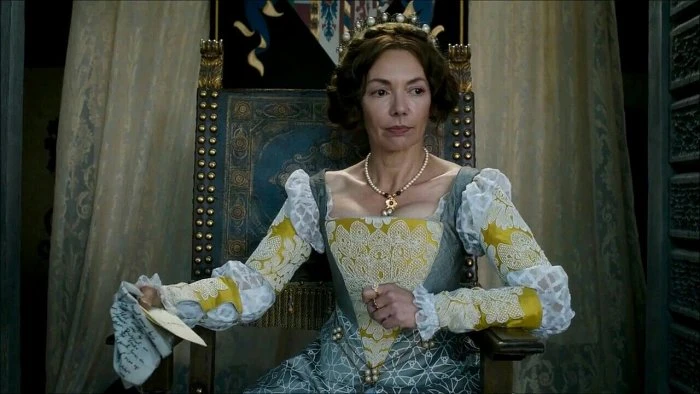
Joanne Whalley cuts an impressive figure as the Dowager Duchess of Burgundy and it is not her fault that the script has her doing ridiculous things. Kenneth Cranham brings his powerful presence to the role of the King's unofficial Prime Minister, Cardinal Morton, and neither is it his fault that he is required to do little more than play the heavy. The real Morton was a famously subtle statesman (he came up with the formula, beloved of tax authorities ever since, that if a man looks rich he has money to pay taxes, and if he looks poor he must be saving and therefore has money to pay taxes).
Rebecca Benson and Andrew Whipp are poignant as a likeable married couple caught in the middle of the big power games.
One of the major problems with The White Queen was that many of the Flemish locations had looked too pretty to be true, even when they were of the appropriate period - Flanders was much wealthier than England at this point. Whether in response to criticism or due to a reduced budget, The White Princess was filmed in Britain and therefore seems more authentic, even when not exactly in period. Those familiar with South Wales and the West of England may have an enjoyable time playing "spot the location" - your reviewer identified Berkeley Castle, Bradford-on-Avon, Wells Cathedral, Caerphilly Castle, Gloucester Cathedral, Cardiff Castle, and Salisbury Cathedral among others. The budget even seems to have stretched to a trip to the actual Alhambra in Granada for a well mounted but truly ludicrous sequence.
There is in general a more realistic air to The White Princess, unless one wants to get picky about certain dyes and fabrics that were only developed later - and it has to be said that even they are excusable because the general look of the production is quite magnificent.
If it is positively silly to suggest that, for example, the Dowager Duchess of Burgundy was running around London conspiring in person, the young Catherine of Aragon was putting on well choreographed dance numbers, the Royal Family attended executions in person, and Perkin Warbeck really was Richard of York, that convenient disclaimer covers such minor sins, and The White Princess is accurate in conveying a deeper truth beneath - that the Tudors were absolutely ruthless and would have done almost anything to keep power. So even if they did not do all of the things shown here, they have no right to complain about being treated unfairly.
Seen this show? How do you rate it?
Seen this show? How do you rate it?
Published on March 30th, 2022. Written by John Winterson Richards for Television Heaven.



